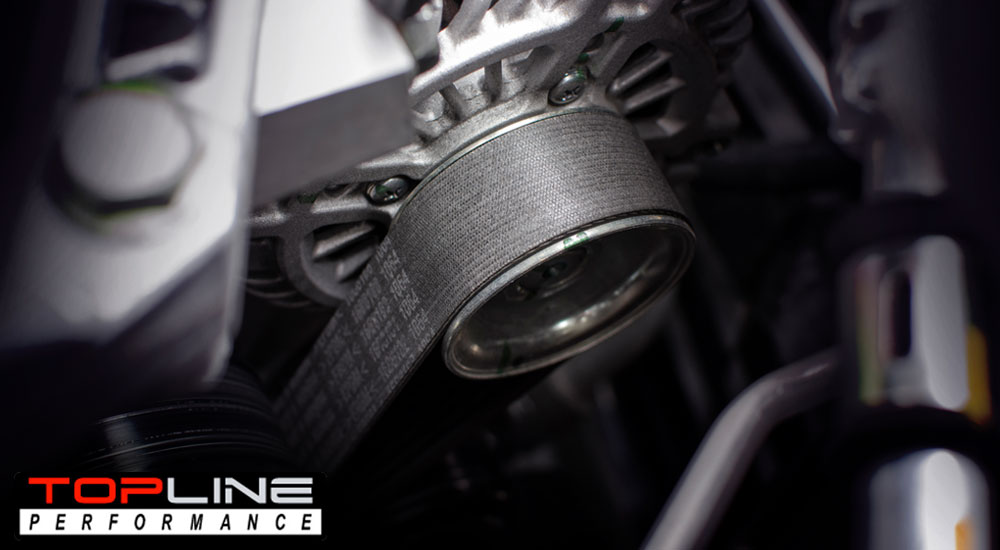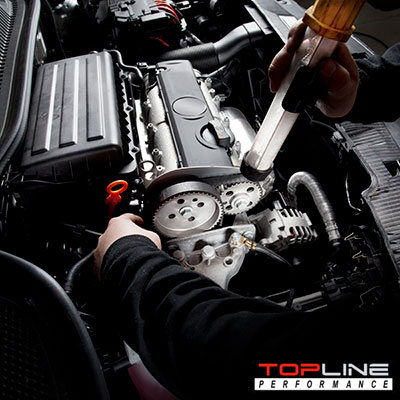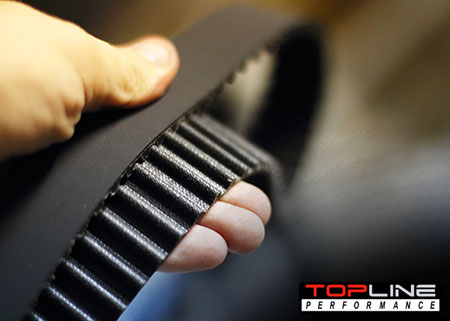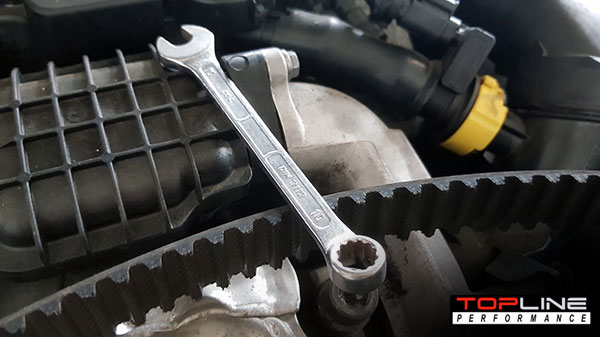Huntington Beach Timing Belt Replacement
Huntington Beach Timing Belt Replacement

While many car issues are well-known to drivers, the timing belt is often overlooked but remains crucial to your vehicle's performance. Neglecting this component can lead to serious engine problems and costly repairs. At TopLine Performance, our skilled technicians ensure your timing belt is always in top condition during routine maintenance. Rest assured, you won't have to worry about unexpected breakdowns if you trust us with your vehicle care. Give us a call today at (714) 477-7138 to schedule your appointment.
Call: (714) 477-7138
What Does the Timing Belt Do?
 The timing belt is the backbone of your car's engine system. Its primary function is to synchronize the rotation of the crankshaft and camshaft, ensuring the engine's valves open and close at precise intervals. Think of it as the conductor of an orchestra, making sure all parts work harmoniously. Without this synchronization, your engine would suffer severe damage, leading to costly repairs or replacements.
The timing belt is the backbone of your car's engine system. Its primary function is to synchronize the rotation of the crankshaft and camshaft, ensuring the engine's valves open and close at precise intervals. Think of it as the conductor of an orchestra, making sure all parts work harmoniously. Without this synchronization, your engine would suffer severe damage, leading to costly repairs or replacements.
When Should It Be Replaced?
There's no universal mileage or time frame for replacing a timing belt, but most experts suggest doing so every 60,000 to 100,000 miles. However, this varies depending on the make and model of your vehicle. Always refer to your owner's manual for specific recommendations. Keep in mind that these guidelines are estimates, and your timing belt could fail before reaching those milestones. Regular maintenance checks can help identify potential issues early, preventing costly repairs down the road.
What Happens If You Don't Replace It?
Failing to replace your timing belt can result in catastrophic engine failure. If the belt breaks, your engine could seize entirely, leaving you stranded and facing expensive repairs. In rare cases, the cost of fixing such damage might exceed the value of the vehicle itself. To avoid these scenarios, follow the recommended replacement schedule outlined in your vehicle's manual. Even minor wear and tear on the timing belt can lead to major problems, so timely replacement is essential for maintaining your car's longevity.
Can You Drive With a Faulty Timing Belt?
 In some cases, you might still be able to drive with a damaged timing belt, but doing so poses significant risks. Imagine driving with a loose wheel—while it might seem functional, it could lead to severe consequences. If you suspect any issues with your timing belt, consult a professional immediately. Look out for signs like engine misfires, stalling, or rough idling, which indicate potential timing belt problems.
In some cases, you might still be able to drive with a damaged timing belt, but doing so poses significant risks. Imagine driving with a loose wheel—while it might seem functional, it could lead to severe consequences. If you suspect any issues with your timing belt, consult a professional immediately. Look out for signs like engine misfires, stalling, or rough idling, which indicate potential timing belt problems.
Can You Get It Replaced Early?
Waiting until the recommended mileage isn't your only option. If you frequently use your vehicle or encounter harsh driving conditions, your timing belt might deteriorate faster than expected. For peace of mind, consider having it inspected and replaced ahead of schedule. This precaution is particularly advisable before embarking on long trips, especially if you're covering thousands of miles. Knowing your vehicle is in optimal condition ensures a stress-free journey.
How Long Does It Take to Replace?
 Although the timing belt is vital, replacing it is generally a straightforward process. Most auto repair shops can complete the task within a day or two, depending on the complexity of the vehicle. Larger or specialized models might require more time. Either way, you'll be back on the road sooner than you think, with peace of mind knowing your engine is running smoothly.
Although the timing belt is vital, replacing it is generally a straightforward process. Most auto repair shops can complete the task within a day or two, depending on the complexity of the vehicle. Larger or specialized models might require more time. Either way, you'll be back on the road sooner than you think, with peace of mind knowing your engine is running smoothly.
Do Different Cars Have Different Timing Belts?
Absolutely. While the basic principles of automotive engineering remain consistent across manufacturers, each brand has its unique approach. Some vehicles come equipped with timing chains instead of belts, offering longer durability and reduced maintenance. For instance, Acura vehicles typically require timing belt replacements less frequently compared to other brands. On the flip side, Ford recommends changing the timing belt every 50,000 miles. Always check your vehicle's manual for specific guidelines tailored to your car.
What If There's Additional Damage?
Ignoring timing belt issues can lead to further complications, increasing both the complexity and expense of repairs. Prevention is always better than cure. Adhering to your vehicle's maintenance schedule helps avoid unnecessary headaches and expenses. Don't let a minor issue escalate into a major repair—regular inspections and timely replacements go a long way in preserving your car's health.
Bar Feeder Centre Bushing,Bar Feeder Center Axis,Fedek Feeder Center Axis,Auto Bar Feeder Center Axis
Shenzhen Boyuan Electromechanical Equipment Co., Ltd. , https://www.boyuanmach.com
